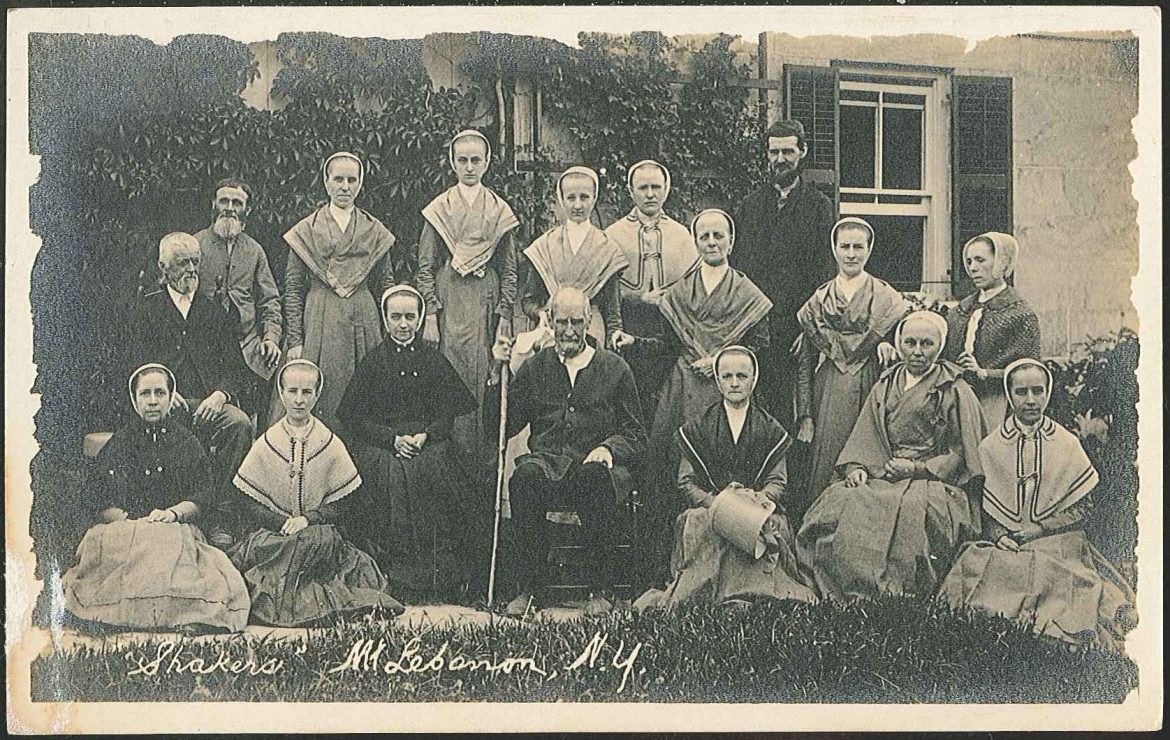
Picture postcard showing a group of Shakers of the North Family, Mount Lebanon, NY. The North Family was well known for activism among the world's people. Shaker Museum | Mount Lebanon 1990.1.4.
In this time of pandemic and all the distress and hardship it entails, it can be helpful to consider how the Shakers of Mount Lebanon and other communities in the region might have responded. The Shakers, in fashioning their communities as “heaven on earth,” sought to be separated from the outside world. But the exchange […]
In this time of pandemic and all the distress and hardship it entails, it can be helpful to consider how the Shakers of Mount Lebanon and other communities in the region might have responded. The Shakers, in fashioning their communities as “heaven on earth,” sought to be separated from the outside world. But the exchange of goods and services with the world’s people was always necessary, and the Shakers were well informed about outside events. As Elder Walter S. Shepherd noted in 1893, “It certainly is not well for Believers to be ignorant of, and to shut their eyes and ears to the distressful conditions existing in the outer world.”
Charitable giving would have been a priority. The Shakers were known to give food, clothing, and other assistance to any who sought it. In 1894 Sister Martha J. Anderson of the Mount Lebanon North Family stated:
I presume our friends [at other communities] have many callers, especially at the Office. ‘The sons of rest,’ as [they] are politely called, make their way to Shaker Villages where their neighbors usually send them, or they come a long distance over the mountain. A Sister once said that everyone was hungry as soon as they stepped on Shaker ground.
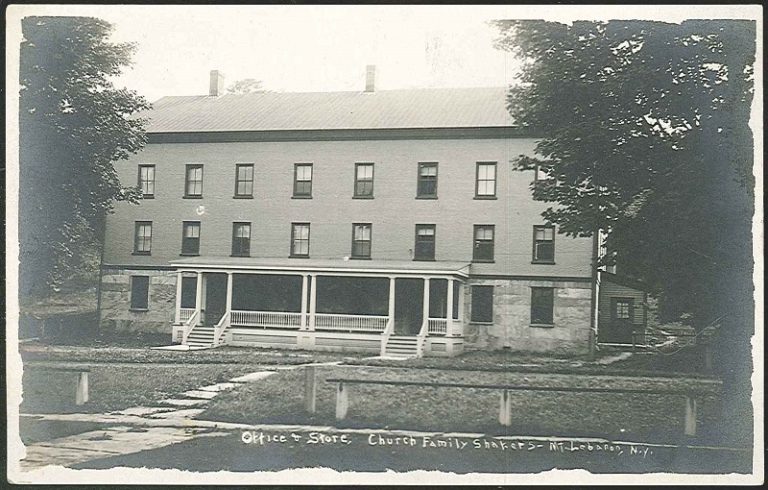
Picture postcard showing the Office and Store of the Church Family, Mount Lebanon. Visitors and those seeking aid came to the Office. 1993.7.95.
There are many examples of the Shakers giving to people outside their own communities . In 1894, Sister Julia Sweet of Hancock wrote:
Our family responded to the call from the St. Vincent De Paul Society of Pittsfield by sending a large amount of clothing to be distributed among the needy suffering ones, also sent to the little ones of Tennessee who are unprovided with mental food a well-filled barrel of papers, magazines, books, etc. Our little folks, whose sympathetic hearts were stirred with pity, generously donated many of their valued toy treasures, some of them being useful as well as ornamental.
That same year, Sister Martha J. Anderson wrote:
We have made up a contribution, and sent to the headquarters of the Salvation Army in New York; it consisted of three barrels (tightly packed) of clothing, one bale of bedding, two barrels of assorted beans, one of dried apples, and twenty-five sacks of potatoes. By applying to the railroad companies, they were taken free.
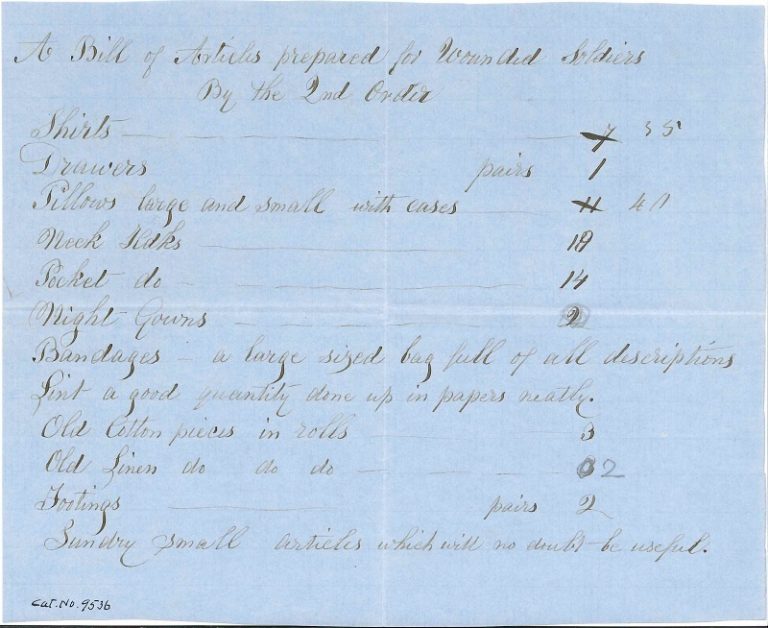
“Bill of Articles prepared for Wounded Soldiers by the 2nd Order” of the Church Family, Mount Lebanon, ca. 1861. Includes clothing and “sundry small articles which will no doubt be useful.” 1957.9536.1.
Sister Martha went on to note that the importance of giving was emphasized by Mother Ann Lee and the earliest Shaker leaders, though at that time the Shakers had little to spare:
In looking over an old record dating back to the establishment of the Church, we find that Believers held strictly to the injunction of Mother Ann and the first Elders to live temperately and practice economy, that they might have something to give to the poor.
Sister Martha also added:
We found it recorded that in several instances, when there were great calamities, they responded liberally to the call for help. I copied the following [from a family journal]: ‘In consequence of the late distress of the poor inhabitants of New York City occasioned by yellow fever, the Churches and Societies of New Lebanon and Hancock made a collection of money to the amount of two hundred and thirty-six dollars, and various kinds of provisions for their relief, which were transported to the city of Hudson in twenty-three wagons….’
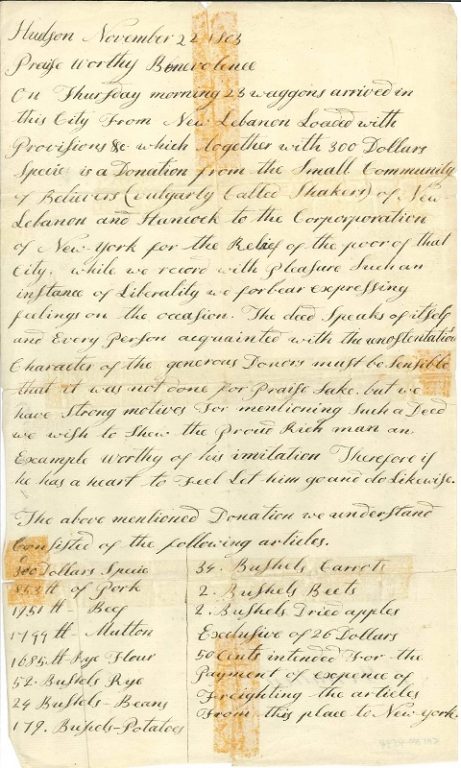
Record of donation to New York, NY, 1803. 23 wagonloads of goods were sent, including nearly two thousand pounds each of beef and mutton, and hundreds of bushels of vegetables. 1957.9594.1.
The Shakers also understood the power of music to uplift and make us feel connected to one another. As Sister Semantha White of Groveland, NY, wrote in 1875:
A deep appreciation and enjoyment of fine appropriate music widens our sphere of thought, quickens the emotional feelings, increases inspiration, and imparts heavenly joy.
In addition to the songs and dances performed at worship meetings, as well as weekly song meetings at which they learned and practiced songs and hymns, the Shakers found opportunities to perform songs and music beyond the meetinghouses. In 1894, Brother George Kirkley of Enfield, NH, wrote:
[On May 10,] our young Sisters gave an organ recital, with recitations and songs interspersed. Many fine selections were played, and some were a revelation in execution and expression. We look forward with pleasure to Recital No. 2.
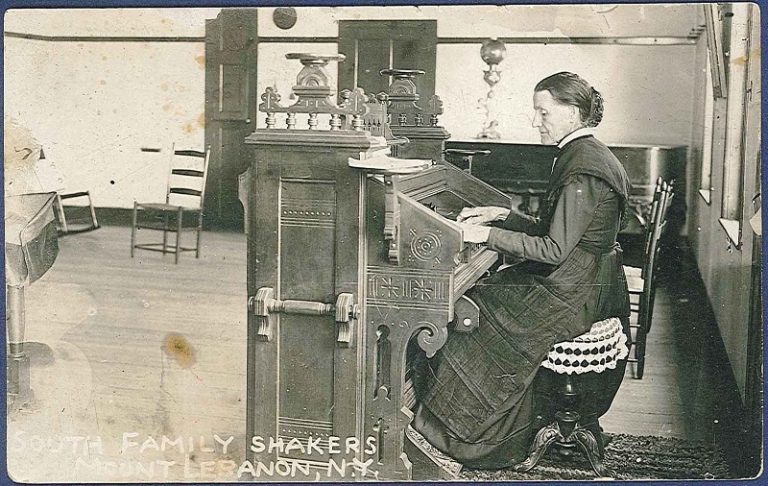
Picture postcard showing Eldress Sarah Collins of the South Family, Mount Lebanon, playing an organ. Shaker Museum | Mount Lebanon 2011.24014.1.
In 1897, Sister Genevieve DeGraw of the Mount Lebanon South Family described a lovely experience:
On a sunny Sunday afternoon of May last, we paused in our occupation to listen to the music in the air, it was like the voice of many waters, as the voice of harpers harping with their harps, and we looked and lo! a company from the North and from the Church and from the neighboring family, were singing, and they sang an old song which we all well knew as they approached our home on the hill, meeting in pleasing communion with we southerners, the family hall resounded with vocal and instrumental music interspersed with compliments and greetings of all concerned. Thus happy an hour passed when the sterner duties of life called us back to our respective posts.
Late in the 19th century, as their numbers grew fewer and their financial conditions worsened, they urged one another to commit to a sense of shared sacrifice, as had been necessary for Mother Ann and the earliest Believers. In 1894, Sister Amelia J. Calver of the Church Family, Mount Lebanon (which was then in very difficult financial straits) wrote:
In these days of financial depression, in common with all interested members of our Communal homes, we are thinking constantly how we can economize and save, since there is so little opportunity to earn…. It cannot be urged too strongly on every member of Community to ‘use the things of this life as not abusing them.’ So let us all keep an inventory of our possessions ever in mind, lest we selfishly accumulate for the ‘moth and rust,’ because we can get it by the asking. This is the honest duty of all, not the few.
More importantly, they recognized the need to count their blessings as they sought to help others when they could. In November of 1894, Eldress Sarah Collins of the South Family of Mount Lebanon wrote:
We have much for which to be thankful, far more than of which to complain. Our temporal needs are supplied and we are able to make some improvements on our buildings. Our store-houses are well filled and we have some to spare for the needy. We have shipped a quantity of apples to New York for poor children. It is blessed to receive and also to give, indeed we are surrounded with blessings in our Mt. Lebanon home, as we think that no place is more favored on the earth, or inside of the earth…. We wish to be a thankful people, especially at this time of the year, and are very glad that we are able to lend a helping hand to others…. It is good for the inner and outer man, and helps us to be thankful more ready to praise than to censure, more willing to assist others than to be assisted.
—
If you are one of our neighbors who has extra to give, or who needs a little extra help during this difficult and strange time, please visit the Chatham Area Silent Pantry or Charlie’s Pantry in New Lebanon. For those in the greater New York and NYC region, the Sylvia Center has put together a list of other area resources, as well as food-related activities for parents and children, and cooking tutorials.
Cellist Yo Yo Ma initiated #SongsofComfort on Twitter to encourage people to share music they find solacing.
Finally, The Greater Good Science Center at the University of California, Berkeley, offers some suggestions for keeping a gratitude journal.